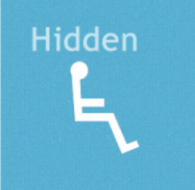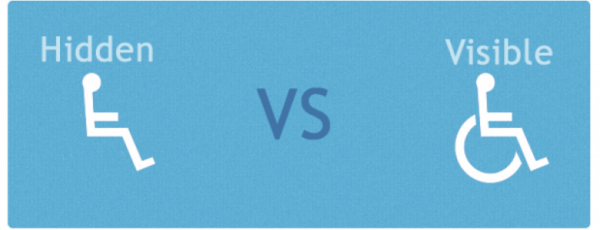It’s obvious that people with invisible disabilities are more discriminated against than those with visible disabilities. But like with every marginalised community, the situation is only spoken about when an incident occurs that warrants public attention, such as when a woman whose son has a brain injury was verbally abused because the accusers claimed that her son ‘doesn’t look disabled’.
At the moment my disability is completely visible, but before I became permanently wheelchair-bound my disability was essentially invisible. While I walked with a limp and often needed someone to hold my hand, when we would park in a disabled spot we would get those ‘should you be parking there’ looks. What such people don’t seem to understand is that I don’t have this disabled parking permit for nothing and CCS Disability Action don’t issue them in vein. One would assume that these are factors people consider before passing judgement on someone who exercises their right to park in a spot that is specifically reserved for them and those alike.
I get the intent of the people who accused her of unlawfully abusing these spaces – they want to make sure that they are kept free for those who genuinely need them. But the issue comes when these well-meaning observers don’t stop to check or think that she may actually be one of those who genuinely need them. Taking that precaution to see if they are entitled to park in that space is as easy as checking to see if their permit is displayed. That is literally all it takes to avoid unfairly humiliating someone in public and in front of their child.
Then there is the obvious absurdity of blaming someone for not being or looking ‘disabled enough’. Its difficult enough having to deal with the pressures of having a disability or caring for someone with a disability. Imagine then being put in the awful position of being forced to prove this to someone. If they tell this particular person that they have a disability-parking permit displayed, they are under no further obligation to explain why they have one. Frankly, it is no one’s business.
I think what this comes down to is a lack of compassion. Vilifying a mother who is simply taking care of her son is not the way any society is supposed to function. If someone parks in a disability parking spot and they don’t have a permit displayed then by all means, question them about it. But jumping to conclusions in such a way is incredibly disheartening and can have regressive consequences when it comes to the progress we’ve made so that people with disabilities no longer have to live on the margins of society.







“While I walked with a limp and often needed someone to hold my hand, when we would park in a disabled spot we would get those ‘should you be parking there’ looks. What such people don’t seem to understand is that I don’t have this disabled parking permit for nothing and CCS Disability Action don’t issue them in vein. ”
Don’t be unfair on people Latifa. It’s New Zealanders simply wanting to make sure that carparks for peoiple with disabilities are used by those entitled to them. I’ve seen too many idiots take up these carparks with some inflated sense of entitlement when they don’t have a permit. One guy told me straight up he’d “borrowed” another person’s disability card because “cripples get all the best carparks”!! Boy did I give him a piece of my mind!!
If the able-bodied people ignored those who mis-use carparks for people with disabilities, wouldn’t that maker us complicit in this odious behaviour?
Anyway I agree that not all disabilities are obvious.
Thanks for this contribution, Latifa.
You raise important disability related issues, and issues that mentally ill face, when facing society at large and individually. Sadly many conditions that are serious or serious enough, do not get taken note of, are not understood, are pre judged and frowned upon. Many out there also like to challenge sick and disabled, as they feel they pay a lot of taxes, and that in some cases it is for supporting people that do not “deserve” it. Such thinking and perception has been promoted by the present government, for political aims.
We sadly have now got that far, that we have “researchers” and “scientists” apply rather selective research and interpretation of reports on such, to try and prove, that many illnesses are nothing but “illness belief” (imagination, to put it simply)!
MSD and WINZ are now relying on “advice” by such “experts” as Mansel Aylward and a few others, and their “hatchet” Principal Health Advisor Dr Bratt is a strong supporter of it all.
To show what challenges there now are, this is must read stuff:
“Belief and illness” (2007) –
http://www.howiefine.com/Health/Belief%20and%20Illness.pdf
By Professor Halligan, School of Psychology, Cardiff University, – also involved in the foundation of the formerly by ‘Unum Provident’ SPONSORED ‘Centre for Psychosocial and Disability Research’ at Cardiff University:
“In the UK some 70 per cent of recipients of incapacity benefit report health-related problems not sufficient to fully explain their incapacity in purely medical terms (Waddell et al., 2002).”
“As a subjective state of being unwell, illness is culturally defined and socially sanctioned. As such, traditional biomedical models will always struggle to provide satisfactory explanations for the patient or clinician. It is equally important to recognise that illness beliefs crucially depend on the views of healthcare professionals and society, all of which dynamically contribute to the interpretations of symptoms, patient presentation and treatment outcomes
(Cherkin et al., 1995).”
This must be read to understand what is behind all this:
http://blacktrianglecampaign.org/2012/05/31/a-tale-of-two-models-disabled-people-vs-unum-atos-government-and-disability-charities-by-debbie-jolly-dpac/
‘A Tale of two Models: Disabled People vs Unum, Atos, Government and Disability Charities’ :Debbie Jolly, 08 April 2012:
http://dpac.uk.net/tag/denial-of-disability-benefits/
Extracts:
“Mansel Aylward, began directing the Centre for Psychosocial and Disability Research at Cardiff University in 2004:a department that Unum Provident paid 1.6 million pounds for. A department set up to provide an academic credibility and a new political slant to the bio-psychosocial model[16] allowing Freud to claim that welfare reform for disability benefits was backed up by evidence that ‘work was good for you’. The department included Alyward, Professor Peter Halligan and Gordon Waddell. One year later Alyward and Waddell produced The Scientific & Conceptual Basis of Incapacity Benefits published by the DWP.”
“In their declarations of interest at the beginning of the text neither man cites their association with UnumProvident. This matters, because the monograph provides the unacknowledged intellectual framework for the 2006 Welfare Reform Bill [originally passed by New Labour]. And the methodology used by Waddell and Aylward is the same one that informs the work of UnumProvident. In a memorandum submitted to the House of Commons Select Committee on Work and Pensions, UnumProvident define their method of working: ‘Our extended experience … has shown us that the correct model to apply when helping people to return to work is a bio-psychosocial one’.”
“Peter Halligan, and Derek Wade of Oxford University (another Woodstock academic) explained the model in the British Medical Journal as something that needed to make a break from old understandings of the bio-psychosocial. ‘The old biomedical model of illness, which has dominated health care for the past century, cannot fully explain many forms of illness.’ What they really meant was that it was not helping reduce the number of applicants for incapacity benefit.”
So we are getting a “softening up” of criteria, a “blurring” of science and the lines between illness, “illness belief” and fitness for work, which they will tell us, will be “beneficial” and “set us free”.
All this does not make it easier for us, that suffer from mental health conditions and other invisible disabilities, to get respected, treated fairly and reasonably.
Ample stuff is found here, that challenges much of what these ‘experts’ want us to believe:
http://accforum.org/forums/index.php?/topic/15188-medical-and-work-capability-assessments-based-on-the-bps-model-aimed-at-disentiteling-affected-from-welfare-benefits-and-acc-compo/
Thanks for posting this Latifa. I’ve got very uncontrolled epilepsy which also falls under the “hidden disability” category, for the simple reason that the majority of us don’t fall flat on our faces every 5 minutes and it’s actually possible for people we have regular contact with not to see us have a seizure. If I didn’t say anything then noone would have a clue there was anything wrong with my brain. Nor are joe public aware that it’s more than just seizures- it can be days out of action recovering, terrible drug side effects, injuries, memory problems. As for discrimination- well it’s still up there with mental illness when it comes to employers, though I’ve noticed in other situations it’s now recognised as a medical condition, but old myths dies hard. (Epileptic= Loony)
I hate having to say I’m on Invalids benefit- I don’t “look” disabled, but I can’t even work parttime anymore. Apparently I’m safe from work testing for now but terrified of the prospect. I don’t think they’d care that no employer would touch me with a barge pole.
But at least I don’t have any problem with disabled car parks- life long driving ban!
Comments are closed.